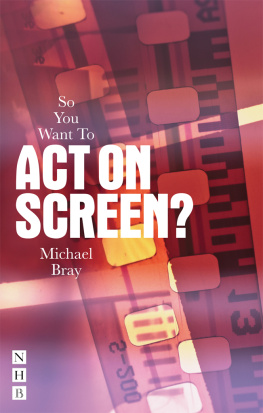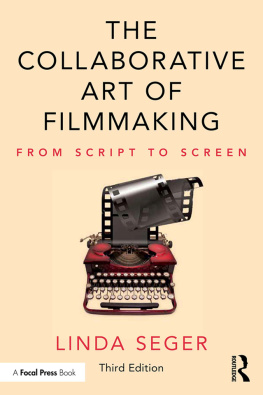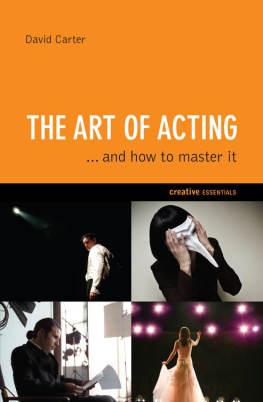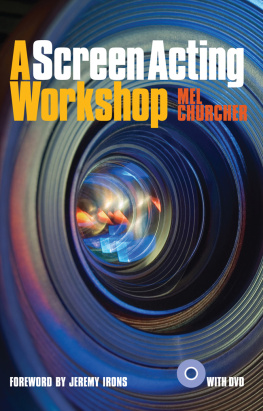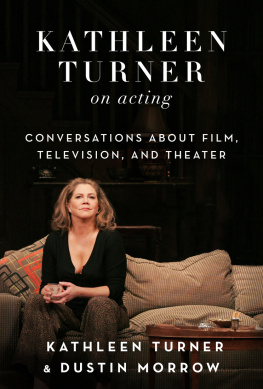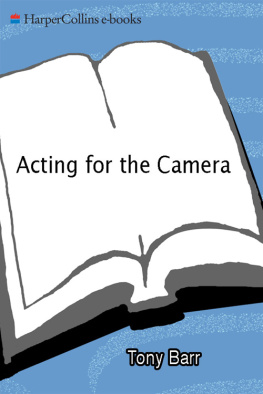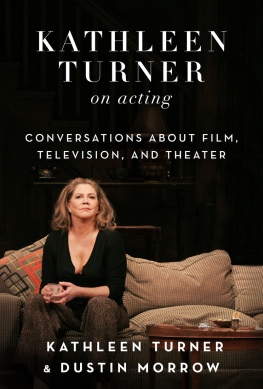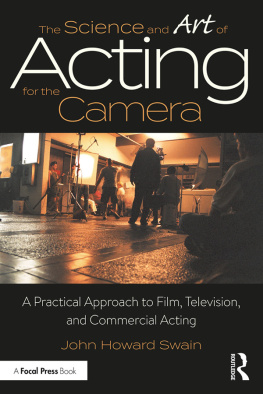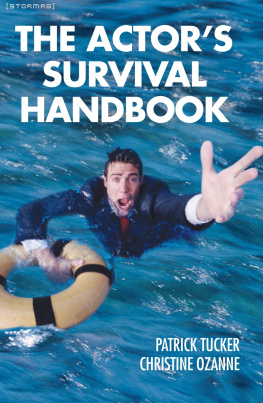SO YOU WANT TO
ACT ON SCREEN?
Michael Bray

NICK HERN BOOKS
London
www.nickhernbooks.co.uk
To Sara, Gabriel and Rose
Introduction
Screen versus Stage
What makes one screen performance better than another? Why are Al Pacinos screen performances so fascinating? What makes his characters bristle with energy? How does Kate Winslet reveal her thoughts so clearly to the audience? What makes Cate Blanchett so believable? Cary Grant so charming? George Clooney so likeable? Tom Hardy so sexy?
There are any number of actors who are unique and talented but somehow have not fulfilled their potential in front of the camera and, similarly, many whose great stage careers simply havent transferred to the screen. Why is this? In part because they lack the screen-acting techniques that would let their talent shine through; the basic skills that would enable them to give the screen performances of which they are truly capable.
I trained as an actor thirty years ago and had a successful career in theatre, film and television before moving into directing film, so Ive seen this from both sides of the camera. Ive worked both with brilliant screen actors and, of course, good actors who just didnt cut it in front of the camera.
So what made the difference? Their process. The process they go through to achieve a performance and the techniques they employ to reveal it to the camera. Sadly, in many cases its a lack of technique that is revealed.
When I began my acting career there was little or no training for the screen. There still isnt enough. The accepted wisdom was that an actor learned to act, then adapted those skills for screen acting. It was only when I started directing film that I realised this assumption was nonsense. While youre actually filming, theres little or no time to teach an actor the basics. Nor do you want to have to coax a performance from them as you would in the theatre. You need actors who can arrive on set having done all the necessary preparation, so that their character is fully rounded and ready to be revealed on screen. You need actors who understand the rhythm of film-making, who can enter the world of the character completely, despite being surrounded on all sides by equipment and crew.
So I started to analyse what it is that makes a good screen performance, and how it can be achieved. What I discovered is that actors have to make some simple but profound changes to the way they approach their craft, the text and their preparation.
This book will give you a clear insight into the art of screen acting, enabling you to deliver performances that will both satisfy you as a creative artist and impress industry professionals, so that they want to employ you again. The book contains exercises and observations that will help you avoid basic errors in your preparation and guide you towards creating exciting, real characters that you can deliver on professional film sets, under the exacting time pressure that todays industry places on the actor.
The book is designed to be read from beginning to end as a step-by-step guide to the art of screen acting, although those who wish to tackle particular acting problems can just dip into it, as can those who have done a number of film and television jobs but feel that they could have done better or want to re-examine their own methods. The exercises can be done easily at home with a video camera or just on a smartphone. You will also need a friend to be your camera operator, preferably someone you can trust not to burst out laughing as you work. Starting to learn the basics of camera craft away from the pressured environment of a studio or a film location will help you tremendously, but for much of the work you will need only yourself, a notebook and your own insight. Remember, this work is not to be viewed by anyone other than yourself. Its a learning tool, not a showreel, so dont worry too much about location and lighting, or quality of picture: thats not the point. The important thing is that you can see the action you have shot clearly.
All the exercises have been designed for single-camera shooting, which means that each angle of the scene is shot with one camera. Consequently, the scene is repeated many times and might even be shot out of sequence, depending how the camera is being moved. Multi-camera work is closer to theatre, in that you will run a scene through and it is then shot by three or more cameras, which are positioned and moved to follow the blocking of the scene. Some television companies still use this system, mostly for soap operas and the occasional comedy programme, but its relatively rare these days.
Single-camera shooting, then, is the standard method for both film and television drama, the major differences between the two being time and money. On a big-budget film you might shoot between two and five minutes of footage a day. On a typical television series, however, you would shoot around eight to twelve minutes of useable footage, and some television series film as many as twenty pages in a day. The number of pages shot varies enormously. A lot of low-budget films shoot as much footage in a day as television, and many big television series especially those currently being made by companies like HBO, Sky, Netflix and Amazon are much closer in their daily ratio to big-budget films. The shooting process is much the same, some are just shot much more quickly than others. A film will probably do fewer set-ups than television, so theres more sitting around, whereas in television you will be shooting constantly and mostly in mid-shot, with lots more dialogue. More about all this later, but for now lets just begin by considering the basics
What is screen acting, and is it really any different from stage acting? Well, yes, its almost completely different. Although stage and screen acting have the same root, in that you are trying to make a character as real as possible within the world created by the writer as Sanford Meisner said, living truthfully under imagined circumstances the process by which you arrive at a performance, and the environment in which you deliver it, are so different as to be virtually two distinct art forms. Lets compare these differences.
The most fundamental difference is the process you go through in creating a performance. Stage acting is linear and organic. The process begins on day one with a read-through of the script, and after that you, the other actors and the director are in a private rehearsal space, working together towards the first night. Good, bad or indifferent, you have shared the creative process; you have watched each others performances develop over the weeks of rehearsal. You are focused on, and share together in, the terrifying pleasure of the first night. When you walk on stage at the beginning of the performance you know what your fellow actors are going to do. You all start at the beginning and move in a direct narrative line towards the end of the play, knowing how and when to build to the plays climax. In theatre, the audience are very much a part of the stage performance: they imagine the play along with the actors. As the late director Sir Peter Hall said, Theatre is the last place left in our society where people imagine together.
When Romeo and Juliet lie in bed at the end of Act Three and discuss whether Juliet heard the nightingale or the lark, the audience does not need to see the first glimmers of sunrise creeping through the window. Shakespeare has conveyed all this through the dialogue. The stage actor uses this shared imaginative energy to complete the illusion.
The experience of an actor on a film set, however, is completely different. Screen acting is
Next page
